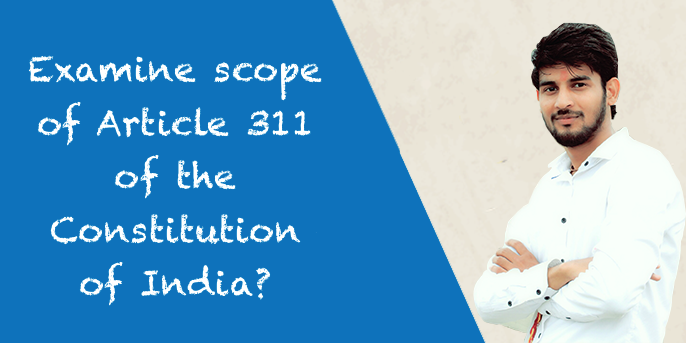Examine scope of Article 311 of the Constitution of India? Explain the unconstitutionality of rules inconsistent with Article 311. Or What constitutional protections are available to Government servents against arbitrary dismissal from service ?
Ans. (1) The main purpose of Article 311 of the Constitution is to protect Government servants from the whims and arbitrary orders of the executive and officer class.Article 311 recognises two exceptions to the well established Doctrine of Pleasure as enshrined in Article 310 of the Constitution of India. In other words, the provisions of the Article 311 operate as a proviso to Article 310 (1) in relation to persons holding civil posts.
These two conditions are as follows :—
(i) that such an employee shall not be dismissed or re-moved by authority subordinate to that by which he was appointed [Article 311 (1)].
(ii) No such person as aforesaid shall be dismissed or re-moved or reduced in rank except after an inquiry in which he has been informed of the charge agaisnt him and given a reasonable opportunity of being heard in respect of those charges. Where it is proposed, after such enquiry, to impose on him any such penalty, may be imposed on the basis of the evidence adduced during such inquiry and it shall not be necessary to give such person any opportunity of making representation on the penalty proposed.
This clause shall however not apply in the following circumstances :—
(a) where a person is dismissed or removed or reduced in rank on the ground of conduct which has led to his conviction on a criminal charge,
Or
(b) where the authority empowered to dismiss or remove a person or to reduce him in rank is satisfied that some reason, to be recorded by that authority in writing, is not reasonably practicable to hold such inquiry; or
(c) where the President or the Governor, as the case may be, is satisfied that in the interest of the security of the State it is not expedient to hold such inquiry, [Art. 311 (2)]. In the Case of Govt. of India v. Tulsi Ram Patel, A.I.R. 1985 (S.C.), Supreme Court has decided (by majority, 4 : 1) that any Government servent of State Government or of Central Government can be dismissed without giving them an opportunity in the interest of public. By this decision the judgment given in D.P.O. Southern Rly, Division v. T.R. Challappan (1975 S.C.) has been extinguished. Dismissal without giving an opportunity of being heard, in the Interest of Public, was taken to be no violation of natural justice. See Art. 311 (2) (a), (b) (c). The 42nd Amendment Act, 1976 amends clause (2) of Art. 311 and takes away the right of Government servants to make a second representation before the penalty is imposed. In S. Krishnamurthy v. General Manager, S. Railway, A.I.R. 1977 S.C. 1868, the appellant was denied promotion owing to the administrative error of the Railway Administration. This injustice was discovered by the Railway Administration and the error was set right. By that time others has been absorbed in the promotion post but the appellant was not. It was held that in the circumstances he was entitled to be promoted to the higher post. The court did not accept his contention to promote him retrospectively. (2) Article 311 of the Constitution makes no distinction between permanent and temporary members of the services or between persons holding permanent or temporary post. This proposition of law was laid down by the Supreme Court in Parshoham v. Union of India, A.I.R. 1958 S.C. 36. (3) If a person’s services are terminated or he is reduced in rank in contravention of the conditions and formalities prescribed by Art. 311 he has a cause of action to complain to the court. In Slate of Maharashtra v, Veerappa R. Saboji, A.I.R. 1980 S.C. 42—Trie Supreme Court held that even in the case of a temporary or officiating Government servant his service cannot be terminated by way of punishment casting a stigma on him in violation of requirement of Art. 311 (2). The provisions of Article 311 of Constitution do not apply in the following cases : (a) to persons in the military service; (b) to persons who do not serve under the Union or a State but under a statutory corporation, such as the Life Insurance Corporation. (4) Now the next problem under consideration is as to what is the position of those rules which are inconsistent with piovisions of Article 311 of the Constitution. The Supreme Court has held in Wadhwa v. Union of India, A.I.R. 1964 S.C. 423, that if a junior police officer has a statutory right to be promoted to the senior scale by seniority in service, and Rule which provides that he would be liable to be demoted ii an officer junior to him is considered more suitable, because a person who has a right to a rank or post cannot be deprived therefo without complying with Art. 311 (2). The Supreme Court has held in a recent case of State of Assam v. A.K. Deb, A.I.R. 1976 S.C. 37, that where the services of a permanent Government servant were terminated under Fundamental Rule 18 ofAssam Fundamental and Subsidiary Rules on account of his continuous absence from duty for more than 5 years and no opportunity was given to him to show cause why the rule was inapplicable, the termination is illegal.








